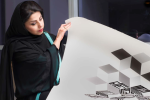Hana Hajar doesn’t consider the work she does groundbreaking–to her, transforming her thoughts into satirical drawings is simply a means to express herself.
But as Saudi Arabia’s sole prominent female cartoonist, Hajar is an undeniable trailblazer.
She has worked since 2005 for the Saudi-based English language newspaper, Arab News, where her sketches challenge everything from the role of women in Saudi society, to the war in Iraq, to the on-again, off-again status of peace talks between the Israelis and Palestinians.
Her cartoons are eye-catching, with many featuring vivid colors and over-pronounced facial features. But present in every sketch is Hajar’s signature incisive wit.

Image via Hana Hajar's website.
In one recent cartoon (pictured above), Hajar broaches the subject of the over-examination of Muslim women in today’s society. In the sketch, a Muslim woman, cloaked in a black hijab and abaya, is surrounded by a throng of hands wielding oversized magnifying glasses, all pointed at her. A fuse trails out behind the woman, as another hand reaches out to light it with a match.



 Another sketch (pictured below) depicts two women in abayas and niqab riding in a taxi, as they are bombarded on all sides by men, thrusting cell phones and phone numbers at them.
Another sketch (pictured below) depicts two women in abayas and niqab riding in a taxi, as they are bombarded on all sides by men, thrusting cell phones and phone numbers at them.

Image via Hana Hajar's website.
The cartoons are humorous, insightful and offer a perspective into Saudi society that is otherwise rarely seen. But when asked to name a favorite, Hajar says she can’t choose just one.
“All my work for me is the best. Each one represents a [different] position, and means a lot to me,” she tells MMW.
For Hajar, drawing the cartoons is the easy part. Breaking into the business was somewhat harder.
“One challenge is women’s entry into this art, which was monopolized by men for a long period of time,” she says. “But I’ve found great encouragement from my family and those who are around me.”
Growing up in Medina, Hajar’s passion for drawing began at an early age, when she found herself painting and sketching cartoons and “cynical personalities” for fun.
What was once a hobby turned into a full-time job years later, when she was offered a position at Arab News after winning a caricature competition.
Now, Hajar churns out satirical cartoons for the newspaper as well as her personal web site, HanaHajar.com, on a regular basis, all as a means to weigh in on whatever topic catches her eye.
“In the event that I want to criticize something, I find that the expression turns to drawing more than expressing it at talking,” Hajar says. “I find myself resorting to drawing.”
Though she delves into controversial topics at times, she says she hasn’t experienced any negative societal or government feedback about her work. But she admits that she censors herself at time, even before her pen hits the paper.
“I do not do anything related to religion, or sex and the limits of this – I lay [those boundaries] down for myself,” she says. “I do not draw anything contrary to my identity as a Muslim. I criticize the negative aspects only.”
The need to practice self-censorship might explain why more women haven’t yet entered the field. But Hajar says she has gotten a deluge of positive feedback from women who tell her they are happy with her work.
She says she hopes to encourage them to become comfortable with expressing their opinions through art.
“I’ll be the first cheerleader to [those] careers,” she says.


